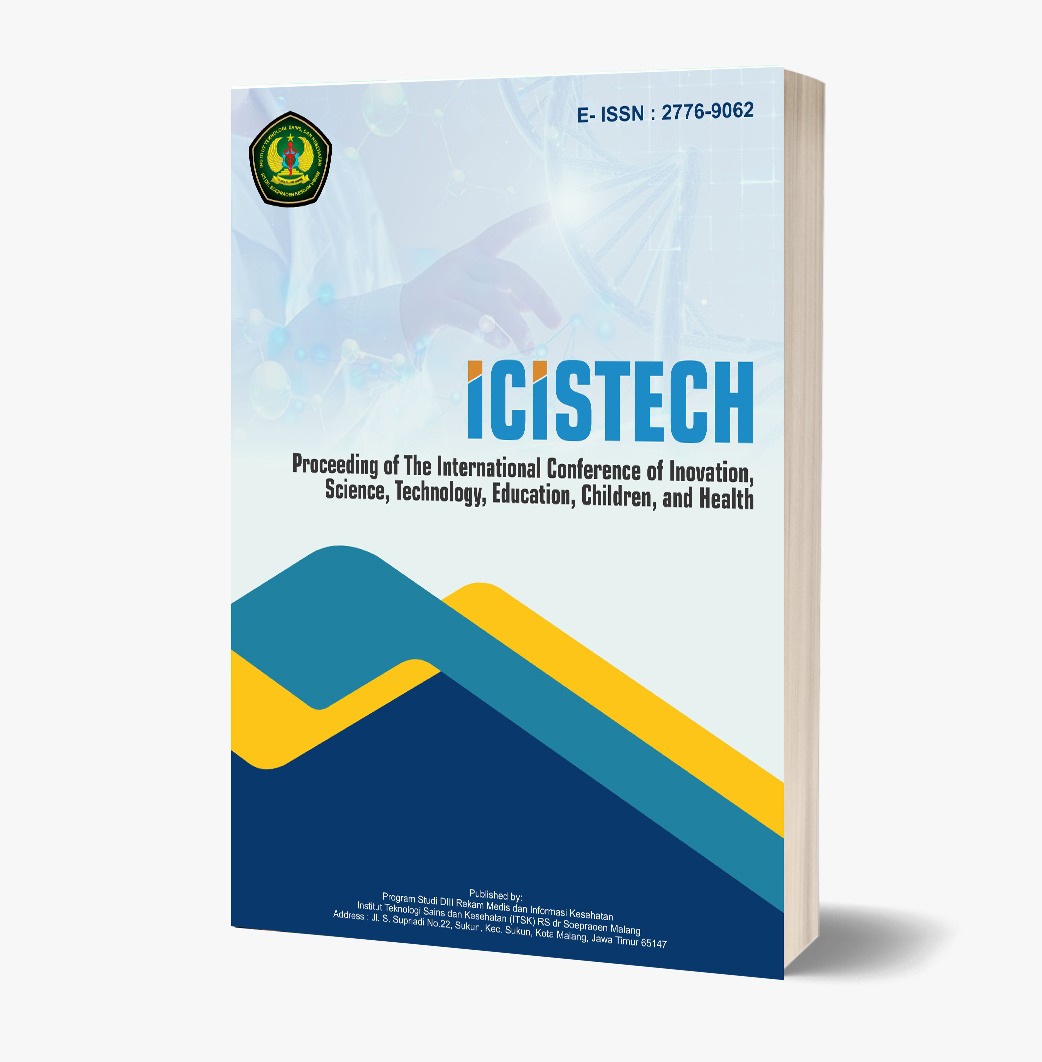Relationship between Viral Load Levels and Malnutrition Screening and Nutritional Status in HIV Patients at RSUD Dr. M Yunus Bengkulu
DOI:
https://doi.org/10.62951/icistech.v4i1.81Keywords:
Human Immunodeficiency Virus, viral load, malnutrition screening, nutritional statusAbstract
Human Immunodeficiency Virus/Acquired Immunodeficiency Syndrome (HIV/AIDS) cases continue to increase and are becoming a top global public health problem. When weight loss is more than 10% below the previous body weight, the relative risk of death is going to increase almost 6-fold. A viral load checkup is a test to measure the amount of HIV in the blood. The increase in nutritional needs and tissue catabolism is caused by the increase in viral load in the body. Malnutrition screening is necessary to evaluate nutritional status so that this treatment can be recommended if the patient is malnourished. This research is an analytical observational study with a cross-sectional design. Analysis was carried out on 109 people living with HIV who received treatment at RSUD Dr. M Yunus Bengkulu. The independent variable in this study is the viral load level, while the dependent variable is screening for malnutrition and the nutritional status of people living with HIV/AIDS—data analysis using the Spearman Rank test. The study results showed no correlation between viral load levels and nutritional status with a value of p=0.243 (p>0.05), and there was a correlation between viral load levels and malnutrition screening with p≤001. The viral load of HIV patients at Dr. M Yunus Bengkulu does not correlate with nutritional status, but it correlates with malnutrition screening.
References
Abbott Molecular Inc. (2007). Abbott RealTime HIV-1.
Amelia, E. R. (2021). Hubungan status gizi terhadap kematian anak HIV/AIDS. Jurnal Medika Hutama, 2(4), 1247–1244.
Anwar, Y., Nugroho, S. A., & Tantri, N. D. (2018). Karakteristik sosiodemografi, klinis, dan pola terapi antiretroviral pasien HIV/AIDS di RSPI Prof. Dr. Sulianti Saroso periode Januari - Juni 2016. PHARMACY: Jurnal Farmasi Indonesia, 15(1), 72. https://doi.org/10.30595/pharmacy.v15i1.1216
Astari, L., Safitri, Y. E., & Hinda, D. P. (2009). Viral load pada infeksi HIV. Berkala Ilmu Kesehatan Kulit & Kelamin, 21(1), 31–39.
Babameto, G., & Kotler, D. P. (1997). Malnutrition in HIV infection. Gastroenterology Clinics of North America, 26(2), 393–415. https://doi.org/10.1016/S0889-8553(05)70301-0
Bengkulu City Health Office. (2022). HIV prevalence in Bengkulu City. Bengkulu.
Berhe, N., Tegabu, D., & Alemayehu, M. (2013). Effect of nutritional factors on adherence to antiretroviral therapy among HIV-infected adults: A case control study in Northern Ethiopia. BMC Infectious Diseases, 13(1), 233. https://doi.org/10.1186/1471-2334-13-233
Centers for Disease Control and Prevention (CDC). (2018). About HIV/AIDS. https://www.cdc.gov/hiv/basics/whatishiv.html
Daka, D. W., & Ergiba, M. S. (2020). Prevalence of malnutrition and associated factors among adult patients on antiretroviral therapy follow-up care in Jimma Medical Center, Southwest Ethiopia. PLoS One, 15(3), e0229883. https://doi.org/10.1371/journal.pone.0229883
Gebrie, M., Perry, L., Xu, X., Kassa, A., & Cruickshank, M. (2023). Nutritional status and its determinants among adolescents with HIV on antiretroviral treatment in low- and middle-income countries: A systematic review and meta-analysis. BMC Nutrition, 9(1), 60. https://doi.org/10.1186/s40795-023-00714-z
Gunawan, F. M., Lestari, P., & Triyono, E. A. (2020). Knowledge and attitude on human immunodeficiency virus among migrant worker candidates in East Java, Indonesia. Althea Medical Journal, 7(3), 111–116. https://doi.org/10.15850/amj.v7n3.1824
Hailemariam, S., Bune, G. T., & Ayele, H. T. (2013). Malnutrition: Prevalence and its associated factors in people living with HIV/AIDS, in Dilla University Referral Hospital. Archives of Public Health, 71(1), 13. https://doi.org/10.1186/0778-7367-71-13
Hu, W., et al. (2011). Malnutrition in hospitalized people living with HIV/AIDS: Evidence from a cross-sectional study from Chengdu, China. Asia Pacific Journal of Clinical Nutrition, 20(4), 544–550. https://search.informit.org/doi/10.3316/ielapa.688297253701794
Indonesian Ministry of Health. (2019). Pedoman nasional pelayanan kedokteran tata laksana malnutrisi pada dewasa. Jakarta: Indonesian Ministry of Health.
Indonesian Ministry of Health. (2021). Laporan perkembangan HIV AIDS & PIMS di Indonesia triwulan I tahun 2021. Jakarta.
Indonesian Ministry of Health. (2022). Laporan eksekutif perkembangan HIV AIDS dan penyakit infeksi menular seksual (PIMS) tahun 2022. Jakarta.
Karyadi, T. H. (2017). Keberhasilan pengobatan terapi antiretroviral. Jurnal Penyakit Dalam Indonesia, 4(1), 1. https://doi.org/10.7454/jpdi.v4i1.105
Kosmiski, L. (2011). Energy expenditure in HIV infection. American Journal of Clinical Nutrition, 94(6), 1677S–1682S. https://doi.org/10.3945/ajcn.111.012625
Liu, X., et al. (2021). Nutritional risk and nutritional status in hospitalized older adults living with HIV in Shenzhen, China: A cross-sectional study. BMC Infectious Diseases, 21(1), 618. https://doi.org/10.1186/s12879-021-06322-1
Marlinda, Y., & Azinar, M. (2017). Perilaku pencegahan penularan HIV/AIDS. Jurnal Of Health Education, 2(2), 192–200.
Nabukenya, A. M., Nambuusi, A., & Matovu, J. K. B. (2020). Risk factors for HIV infection among married couples in Rakai, Uganda: A cross-sectional study. BMC Infectious Diseases, 20(1), 198. https://doi.org/10.1186/s12879-020-4924-0
Nanewortor, B. M., Saah, F. I., Appiah, P. K., Amu, H., & Kissah-Korsah, K. (2021). Nutritional status and associated factors among people living with HIV/AIDS in Ghana: Cross-sectional study of highly active antiretroviral therapy clients. BMC Nutrition, 7(1), 14. https://doi.org/10.1186/s40795-021-00418-2
Ng’ambi, W. F., et al. (2022). Factors associated with HIV viral suppression among children and adults receiving antiretroviral therapy in Malawi in 2021: Evidence from the Laboratory Management Information System. Tropical Medicine & International Health, 27(7), 639–646. https://doi.org/10.1111/tmi.13782
Notoatmodjo, S. (2022). Promosi kesehatan & ilmu perilaku. Rineka Cipta.
Ochodo, E. A., Olwanda, E. E., Deeks, J. J., & Mallett, S. (2022). Point-of-care viral load tests to detect high HIV viral load in people living with HIV/AIDS attending health facilities. Cochrane Database of Systematic Reviews, 2022(3). https://doi.org/10.1002/14651858.CD013208.pub2
Prawira, Y., Uwan, W. B., & Ilmiawan, M. I. (2020). Karakteristik penderita infeksi HIV/AIDS di klinik voluntary counseling and testing Lazarus RS St. Antonius Pontianak tahun 2017. Jurnal Cerebellum, 5(4A), 1519. https://doi.org/10.26418/jc.v5i4A.43017
Putra, M. A. S., Geografi, L., & Sinaga, C. R. (2023). Correlation compliance antiretroviral therapy with levels viral load in HIV patients at poly clinic VCT Abdoel Wahab Sjahranie Samarinda Hospital 2022. Pharmacon, 12(2), 238–243.
Riani, M., Gobel, F. A., & Nurlinda, A. (2021). Faktor risiko penularan HIV pada pasangan serodiscordant di Yayasan Dukungan Kelompok Dukungan Sebaya Makassar. Window of Public Health Journal, 1(5), 464–470. https://doi.org/10.33096/woph.v1i5.159
Safitri, N. R., Fadraersada, J., & Rusli, R. (2019). Studi terapi antiretroviral pada pasien HIV/AIDS di Kota Samarinda. Proceeding of Mulawarman Pharmaceuticals Conferences, 9, 7–13. https://doi.org/10.25026/mpc.v9i1.342
Schramm, B., et al. (2022). Viral suppression and HIV-1 drug resistance 1 year after pragmatic transitioning to dolutegravir first-line therapy in Malawi: A prospective cohort study. Lancet HIV, 9(8), e544–e553. https://doi.org/10.1016/S2352-3018(22)00136-9
Seid, A., Seid, O., Workineh, Y., Dessie, G., & Bitew, Z. W. (2023). Prevalence of undernutrition and associated factors among adults taking antiretroviral therapy in sub-Saharan Africa: A systematic review and meta-analysis. PLoS One, 18(3), e0283502. https://doi.org/10.1371/journal.pone.0283502
Shifera, N., Yosef, T., & Mekonen, M. (2022). Clinical and behavioral factors associated with undernutrition among highly active antiretroviral therapy users in Southwest Ethiopia. Frontiers in Nutrition, 9. https://doi.org/10.3389/fnut.2022.914983
Thamrin, H. Y., Appe, S., Nelini, N., & Rahim, E. (2023). Gambaran viral load pasien HIV/AIDS di Rumah Sakit Umum Daerah Kota Kendari. Sentri: Jurnal Riset Ilmiah, 2(8), 2892–2898. https://doi.org/10.55681/sentri.v2i8.1303
Thimmapuram, R., Lanka, S., Esswein, A., & Dall, L. (2019). Correlation of nutrition with immune status in human immunodeficiency virus outpatients. Missouri Medicine, 116(4), 336–339.
UNAIDS. (2024). Global HIV & AIDS statistics — Fact sheet. United Nations Programme on HIV and AIDS. https://www.unaids.org/en/resources/fact-sheet?_ga=2.131667279.1753653131.16960586931243861714.1696058693&_gl=1*1ukzzm4*_ga*mti0mzg2mtcxnc4xnjk2mdu4njkz*_ga_t7fbezexnc*mty5nja1ody5my4xljeumty5nja1odcxos4znc4wlja
Wright, L., Konlan, M. B., Boateng, L., & Epps, J. B. (2021). Nutrition risk and validation of an HIV disease-specific nutrition screening tool in Ghana. South African Journal of Clinical Nutrition, 34(1), 22–26. https://doi.org/10.1080/16070658.2019.1638609
Yadav, J., Gautam, S., & Singh, K. J. (2016). Differential in awareness and comprehensive knowledge of HIV/AIDS and its determinants among youth in India: A population-based cross-sectional study. American International Journal of Research in Humanities, Arts and Social Sciences, 13(3), 222–230.
Downloads
Published
How to Cite
Issue
Section
License
Copyright (c) 2024 Proceeding of The International Conference of Inovation, Science, Technology, Education, Children, and Health

This work is licensed under a Creative Commons Attribution-ShareAlike 4.0 International License.













